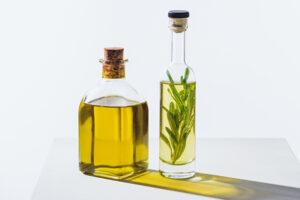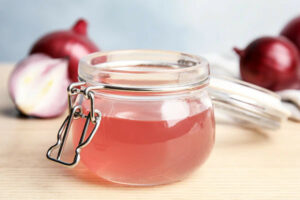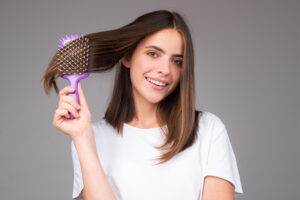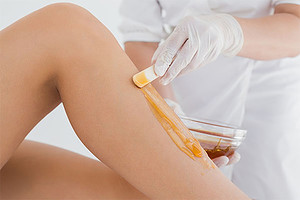The benefits of coconut oil for hair problems such as dryness, dandruff, and frizz are well known in many cultures around the world, with children spending evenings with their grandmas who would massage their hair with oil.
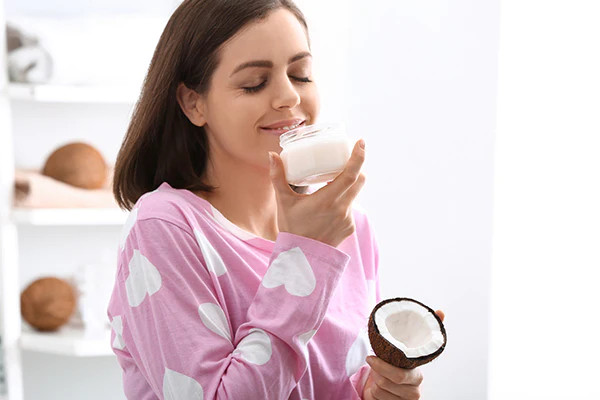
Although people nowadays may have not heeded the warnings of moms and grandmas about applying too many chemicals to the tresses, it is not too late to get back to nature. Using coconut oil on the scalp and hair has many benefits, as this oil possesses excellent moisturizing and antifungal properties.
This article discusses the benefits and importance of applying coconut oil to treat dandruff, as well as the causes of dandruff and its effects on the hair and scalp.
What Is Dandruff?
Dandruff is a prevalent scalp disorder that affects half of the population in every country, beginning from the prepuberty stage. This condition gets worse during the winter. (1)
Dandruff is a fungal infection that affects the scalp, causing excessive dryness and flakiness. The excessive oil secretion makes the scalp a breeding ground for fungi and bacteria.
The most annoying part of dandruff is the white flakes appearing on combs, shoulders, and clothes. It can damage your self-esteem and cause hair loss and hair breakage.
Article Contents
Why Coconut Oil Is an Excellent Dandruff Treatment
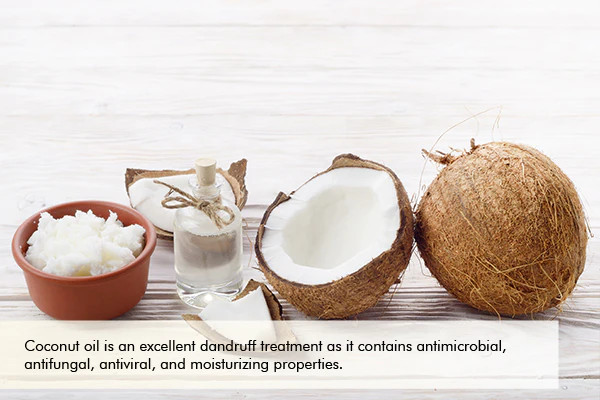
1. Antimicrobial, antifungal, and antiviral properties
As already mentioned above, dandruff is caused by factors such as fungi. As good-quality coconut oil contains antimicrobial and antifungal properties, it assists in controlling scalp-related issues such as dandruff.
One study evaluated the efficiency of high-quality coconut oil on the growth of bacteria and fungi. It was found that exposure to lauric acid in coconut oil inhibited the growth of bacterial cells and fungi.
Among all the fatty acids in coconut oil, monolaurin, a monoglyceride of lauric acid, has been found to exhibit significant antimicrobial activity as it disintegrates the lipids of bacteria such as Staphylococcus aureus, S. epidermidis, Pseudomonas aeruginosa, and Bacillus subtilis, among others.
Some more studies conducted also concluded that monolaurin has antiviral and antifungal action. (2)
2. Moisturizing properties
Keeping the scalp moist and hydrated during a bout of dandruff is vital as the condition strips the scalp of moisture and causes dryness and flakiness. The moisturizing properties of good-quality coconut oil help prevent scalp dryness, facilitating dandruff control.
Pure coconut oil processed from the kernel of mature coconuts has an emollient effect that successfully treats skin dryness and works as a therapeutic moisturizer. (3)
3. Anti-inflammatory action
Dandruff causes scalp itchiness and scaliness that increases with the severity of the condition. Applying pure coconut oil helps lessen its severity and improves the skin barrier capacity.
Coconut oil has an anti-inflammatory effect on the skin, a boon to those with scalp-related disorders such as dandruff. (2)
How to Use Coconut Oil to Treat Dandruff
There are many ways to apply coconut oil to the scalp. Here are some popular ways to use it to get rid of dandruff:
1. Coconut oil with onion juice
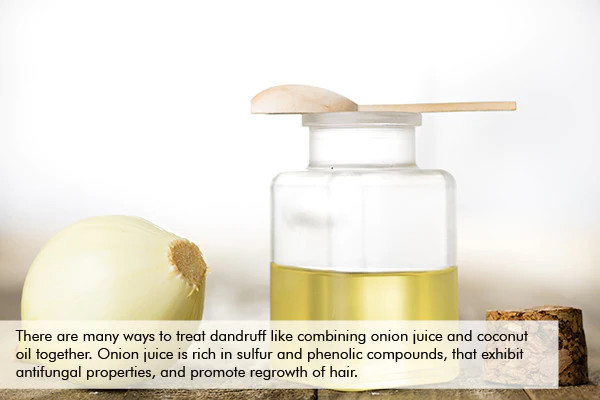
Onion juice is rich in sulfur and phenolic compounds that exhibit antifungal properties and promote regrowth of hair after falling due to scalp disorders.
One study found that when onion juice was used by patients to wash their hair for eight weeks, 87% of the patients experienced full hair regrowth, in comparison to 13% who used just tap water. (4)
How to use:
- Dice 6–7 onions and blend them to form a smooth paste.
- Pass this paste through a sieve and extract the onion juice. You may store this onion juice in the fridge for 5 days.
- Combine 1 tbsp of onion juice and 1 tbsp of coconut oil.
- Massage your scalp and hair with the mixture, and keep it on for 30–45 minutes. Apply this oil mixture as a prewash, postwash, or both to get maximum relief from dandruff.
- Wash it off with an antidandruff shampoo.
- Use it twice a week to achieve good results.
2. Coconut oil with lemon juice
Lemons are rich in vitamins B and C. The powerful antioxidant properties of vitamin C help strengthen hair follicles and promote the production of collagen, which helps repair the damaged skin cells due to dandruff and other scalp diseases.
A study showed that vitamin B helps to improve skin conditions on the scalp. (5) It was found that vitamin B deficiency could trigger infection of the nails, skin rashes, and seborrheic dermatitis, a leading reason for dandruff. (6)
How to use:
- Extract lemon juice from 3–4 lemons.
- Store the lemon juice in an airtight container for future use.
- Combine 1 tbsp of lemon juice with 2 tbsp of coconut oil.
- Use this mixture to massage your scalp.
- Leave it on for about 30 minutes, and then wash it off with antidandruff shampoo.
- Use it twice a week for good results.
3. Coconut oil with yogurt (dahi)
Who doesn’t love radiant hair and skin? Yogurt is a natural ingredient available in most homes, and it works wonders on the hair and scalp due to its abundant probiotic bacteria.
When combined with the beautiful moisturizing and antimicrobial properties of coconut oil, it helps relieve symptoms of dandruff and restores scalp health and hair thickness.
A study demonstrated that probiotic yogurt usage results in good hair growth due to a bacteria-related mechanism. (7)
How to use:
- Combine 2–3 tbsp of high-quality coconut oil with 1/2 cup of fresh yogurt.
- Apply the mixture to your scalp and hair. Spread it all over your scalp and hair, and gently massage it with your fingertips.
- Allow it to stay on your scalp for 30–45 minutes before washing it off with antidandruff shampoo.
- You can use this combination twice a week for maximum results.
Causes of Dandruff
1. Malassezia
One of the causes of dandruff is the yeast called Malassezia, whose colonization increases in the scalp during this disorder. Multiple studies indicate a link between Malassezia and scalp health and that scalps with dandruff have a marked increase in the abundance of Malassezia. (2)
As any organism thrives when it is well fed, Malassezia feeds on the saturated fatty acids in the sebum. Thus, an oily scalp is the best environment for Malassezia to proliferate and disturb the skin’s natural cell renewal. The scalp cells cluster together, looking like white flakes.
Antifungal treatment is required to get rid of this scalp infection. Using coconut oil helps as it not only hydrates the scalp but also exhibits antimicrobial properties that fight bacteria and fungi.
2. Excess oil
The scalp is rich in sebum, which becomes an excellent nutrient source for bacteria and fungi during puberty. Oily scalps are one of the main reasons for the onset of dandruff as it induces the growth of fungi and yeast, especially Malassezia, which feeds on fat.
Research found that the presence of cholesterol and its esters encouraged the colonization of Malassezia. (1)
3. Other causes
Pollution, harsh chemicals, and cold weather can also impact your scalp health and worsen dandruff.
General Queries Related to Coconut Oil
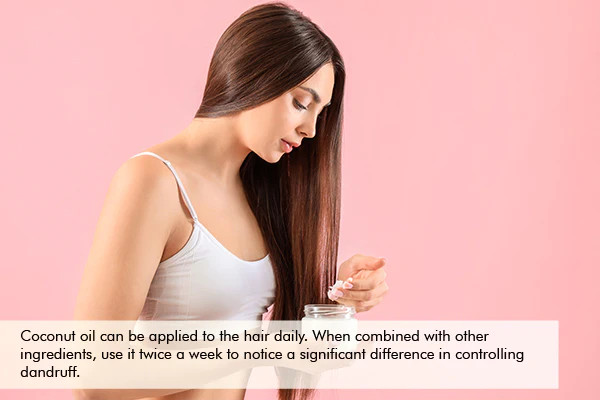
How often should you use coconut oil on the scalp?
Coconut oil can be applied to the hair daily. When you combine it with other ingredients, use it twice a week to notice a significant difference in controlling dandruff.
How deep does the coconut oil go into the scalp while massaging?
Coconut oil can penetrate deep into the roots and go deep into the shaft of the hair. The best remedy for treating dry and oily scalp is regularly using coconut oil as a moisturizer. This will eliminate scalp-related problems and fungal infections.
How to use coconut oil on the scalp for dandruff treatment?
Coconut oil can be applied directly to the scalp. If you want to have quick results, then use warm coconut oil on your scalp to reduce dandruff-related symptoms such as itching, redness, and flaky formations.
How long should I leave the coconut oil on the scalp when I use it with other ingredients?
As coconut oil has many benefits, you can apply it and keep it on overnight and wash it off the next day.
But when you are using acidic and pungent compounds such as onion juice, lemon juice, and yogurt, leave it on your scalp for 30–45 minutes only before washing it off with antidandruff shampoo.
Final Word
Pure coconut oil is indispensable for anyone who wants to have lustrous tresses with a scalp free of scalp disorders such as dandruff.
Get the most out of this effective hair oil by combining it with onion juice, lemon juice, and yogurt for long-term benefits for the hair and scalp.
References
- Ranganathan S, Mukhopadhyay T. Dandruff: The most commercially exploited skin disease. Indian journal of dermatology. https://www.ncbi.nlm.nih.gov/pmc/articles/PMC2887514/. Published 2010.
- Lin T-K, Zhong L, Santiago JL. Anti-inflammatory and skin barrier repair effects of topical application of some plant oils. International journal of molecular sciences. https://www.ncbi.nlm.nih.gov/pmc/articles/PMC5796020/. Published December 27, 2017.
- Varma SR, Sivaprakasam TO, Arumugam I, et al. in vitro anti-inflammatory and skin protective properties of virgin coconut oil. Journal of traditional and complementary medicine. https://www.ncbi.nlm.nih.gov/pmc/articles/PMC6335493/. Published January 17, 2018.
- Hosking A-M, Juhasz M, Atanaskova Mesinkovska N. Complementary and alternative treatments for alopecia: A comprehensive review. Skin appendage disorders. https://www.ncbi.nlm.nih.gov/pmc/articles/PMC6388561/. Published February 2019.
- S; BJD. A review of Vitamin B12 in dermatology. American journal of clinical dermatology. https://pubmed.ncbi.nlm.nih.gov/25559140/.
- Pullar JM, Carr AC, Vissers MCM. The roles of Vitamin C in Skin Health. Nutrients. https://www.ncbi.nlm.nih.gov/pmc/articles/PMC5579659/. Published August 12, 2017.
- Levkovich T, Poutahidis T, Smillie C, et al. Probiotic bacteria induce a ‘glow of health’. PloS one. https://www.ncbi.nlm.nih.gov/pmc/articles/PMC3547054/. Published 2013.
- Rudramurthy SM, Honnavar P, Dogra S, Yegneswaran PP, Handa S, Chakrabarti A. Association of malassezia species with Dandruff. The Indian journal of medical research. https://www.ncbi.nlm.nih.gov/pmc/articles/PMC4069738/. Published March 2014.


